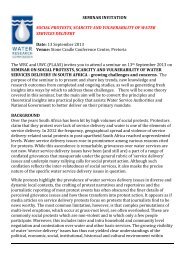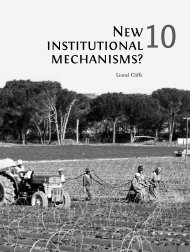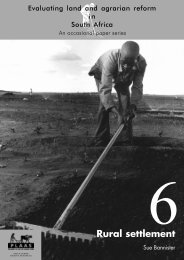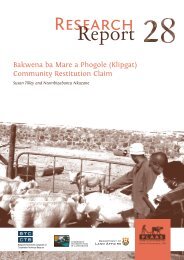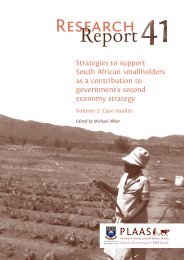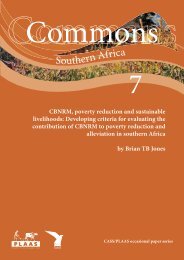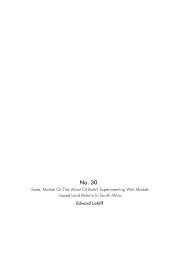A critical appraisal of South Africa's market-based land reform policy
A critical appraisal of South Africa's market-based land reform policy
A critical appraisal of South Africa's market-based land reform policy
You also want an ePaper? Increase the reach of your titles
YUMPU automatically turns print PDFs into web optimized ePapers that Google loves.
Chapter 2: International <strong>land</strong> <strong>reform</strong> debates<br />
legislation in a number <strong>of</strong> other countries<br />
such as Tanzania, Guinea, Sudan, Mali,<br />
Nigeria, Burkina Faso, Zaire, Uganda,<br />
Somalia and Zambia (Bruce 1993:24).<br />
Post-independence Zimbabwe was<br />
constrained in its redistribution <strong>of</strong> <strong>land</strong> by<br />
shortages <strong>of</strong> cash and the Lancaster House<br />
agreement that prohibited expropriation <strong>of</strong><br />
<strong>land</strong> without paying <strong>market</strong>-value<br />
compensation (Ghimire 1999). Despite this<br />
the Zimbabwean government acquired 2.7<br />
million hectares during the 1980s, most <strong>of</strong><br />
which was allocated to 52 000 black<br />
families who were issued with <strong>land</strong>-use<br />
permits (Bruce 1993:28).<br />
Radical <strong>land</strong> <strong>reform</strong>s have not been<br />
confined to Africa. All <strong>land</strong> above a set<br />
ceiling for maximum <strong>land</strong>holding was<br />
acquired through compulsory purchases<br />
by the governments <strong>of</strong> Taiwan, <strong>South</strong><br />
Korea and Japan during the 1940s and<br />
50s. Some compensation was paid, but at a<br />
rate well below <strong>market</strong> value. The peasant<br />
farmers were assisted with the purchase, at<br />
nominal prices, through the provision <strong>of</strong><br />
credit (Griffin et al. 2002:303–9). In China<br />
and Vietnam <strong>land</strong>lords were overthrown<br />
after the seizure <strong>of</strong> power through<br />
revolutionary action. China and Vietnam<br />
followed similar paths <strong>of</strong> <strong>land</strong> seizure,<br />
distribution <strong>of</strong> <strong>land</strong> to poor peasants<br />
followed by collectivisation <strong>of</strong> production<br />
and, in the 1980s, a return <strong>of</strong> the <strong>land</strong> to<br />
peasant families who were found to be<br />
more productive than the collectives<br />
(Griffin et al. 2002:313).<br />
Land <strong>reform</strong>s in the 20 th century that<br />
have been successful in increasing<br />
productivity and reducing poverty 1 have<br />
largely involved breaking up large<br />
<strong>land</strong>holdings. Ownership <strong>of</strong> small pieces<br />
<strong>of</strong> arable <strong>land</strong> was given to tenants who<br />
already worked the <strong>land</strong> but previously<br />
had to pay rents or share their crops with a<br />
<strong>land</strong>lord. These peasant farmers, freed<br />
from the burden <strong>of</strong> the <strong>land</strong>lord, utilised<br />
the <strong>land</strong> more intensively thus increasing<br />
productivity, creating employment, and<br />
reducing poverty (Griffin et al. 2002).<br />
Land <strong>reform</strong>s involving the transfer <strong>of</strong><br />
<strong>land</strong> from ‘haciendas’ – large estates or<br />
plantations – to peasants or labourers, as<br />
has been attempted in Latin America and<br />
parts <strong>of</strong> Asia and Africa, have been far less<br />
successful (World Bank 2003:143;<br />
Binswanger & Deininger 1996:75).<br />
However, as mentioned above,<br />
positive impacts have been reported<br />
from countries such as Kenya and<br />
Zimbabwe in the early phases <strong>of</strong><br />
their post-independence <strong>land</strong><br />
<strong>reform</strong>s. (World Bank 2003:xl).<br />
Agriculture, the economy and<br />
poverty reduction<br />
One <strong>of</strong> the strongest arguments for redistributive<br />
<strong>land</strong> <strong>reform</strong> is that it can create<br />
an environment for growth in agricultural<br />
production that will in turn support broader<br />
economic growth and have a positive impact<br />
on poverty reduction. Such arguments<br />
are supported by information showing that<br />
countries with a more equitable distribution<br />
<strong>of</strong> <strong>land</strong> tend to have higher levels <strong>of</strong><br />
economic growth, while high levels <strong>of</strong><br />
<strong>land</strong> concentration are <strong>of</strong>ten associated<br />
with less efficient resource utilisation<br />
(World Bank 2003:18–20).<br />
The growth in agricultural production<br />
that has been attributed to <strong>land</strong> <strong>reform</strong>s<br />
has come from the de-concentration <strong>of</strong><br />
<strong>land</strong>holding to create or strengthen smallscale<br />
owner-operated or family farms.<br />
Prosterman and Riedinger, amongst others,<br />
have argued that there is an inverse farm<br />
size-efficiency relationship in which<br />
smaller farms, where the producer has a<br />
secure owner or owner-like relationship to<br />
the <strong>land</strong>, produce a substantially better<br />
return per hectare and on investments than<br />
any other model <strong>of</strong> agricultural production<br />
(Prosterman & Riedinger 1987:46–9).<br />
They also argue that such analysis <strong>of</strong><br />
productivity probably hides the full extent<br />
<strong>of</strong> the advantage <strong>of</strong> the owner-operator<br />
system as it is <strong>based</strong> on only the main<br />
crops and does not take into account the<br />
variety <strong>of</strong> other crops normally grown on<br />
small owner-operated farms (Prosterman &<br />
Riedinger 1987:58–66).<br />
Other reasons <strong>of</strong>fered for the beneficial<br />
affects <strong>of</strong> redistributive <strong>land</strong> <strong>reform</strong> are the<br />
5




